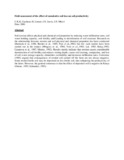| dc.description.abstract | Soil erosion affects physical and chemical soil properties by reducing water infiltration rates, soil water holding capacity, soil fertility and Ieading to deterioration of soil structure.
Research on the relationship between erosion and soil physical and chemical properties has been conducted (Battison et al., L98l; Becher et al., 1985; Frye et al.,1982) but few such studies have been carried out in the tropics (Mbagwu et al., 1984; Yost et a1.,1985; Lal, 1985; Belay,1992; Casanova et al., 1987; Merete, 1992). Results mostly indicate that erosion causes considerable deterioration of soil fertility and reduces rooting depth, causes soil crusting, compaction, loss of soil water storage capacity, diminishes
workability and decreases infiltration rates. Crosson, (1985) argued that consequences of
eroded soil carried off the farm are not always negative. Some eroded fertile soil may be
deposited on less fertile soil, thus enhancing the productivity of the latter. However, the general consensus is that the effect of deposited soil is negative in Kenya (Otieno, 1993; Schneider, 1993). | en |

